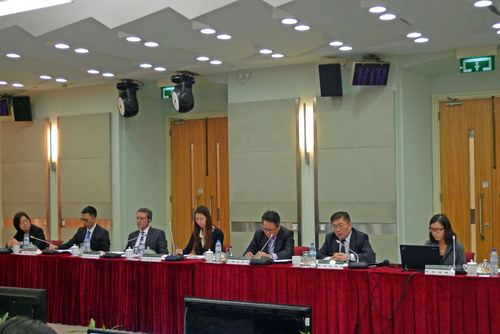 Representatives of legal affairs departments introduce the reform proposal regarding the centralised mechanism for legislation drafting.
Representatives of legal affairs departments introduce the reform proposal regarding the centralised mechanism for legislation drafting.
The Secretary for Justice and Administration, Ms Chan Hoi Fan, chaired a plenary session of the Coordinating Council for Reform of Public Administration. Issues discussed included how to optimise the coordinating mechanism for legislative proceedings, and reform of the centralised system for drafting legislation. At the session, held on 5 October, the Secretary, who is also the President of the Council, stressed the aim of strengthening the coordinating mechanism was to make preparation of legislation more efficient, and to enhance the quality and efficiency of legislation drafted by different departments of the Government. Members of the Council also discussed the issue of simultaneous consultation on different policies. They agreed to strengthen internal communication for the coordination of consultative works. Ms Chan said it was necessary continuously to optimise the arrangement for collecting public opinions regarding different policies. That was in order for the public to acquire relevant information more easily and express their opinions accordingly, she said. Other members at the meeting included: the Council’s Acting Secretary-General Ms Joana Maria Noronha; representatives of policy secretaries; representatives of legal affairs departments; representatives of the Civil and Municipal Affairs Bureau; and representatives of the Financial Services Bureau. The Coordinating Council for Reform of Public Administration was established in 2007. Its aim is to accommodate the decision-making of the Public Administration Reform Consultation Committee; to coordinate policy consultation; and to formulate planning for policy execution.
View gallery


